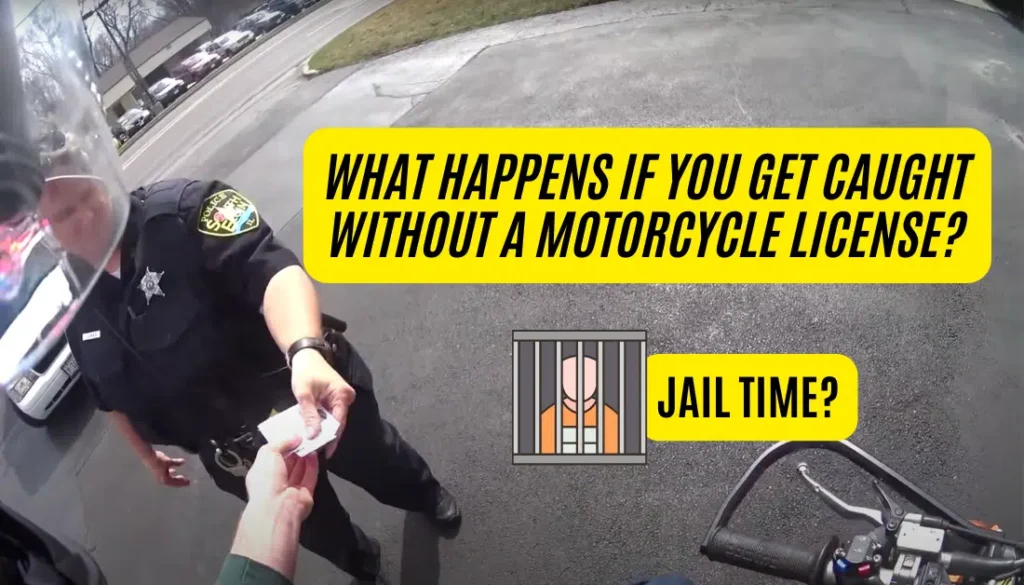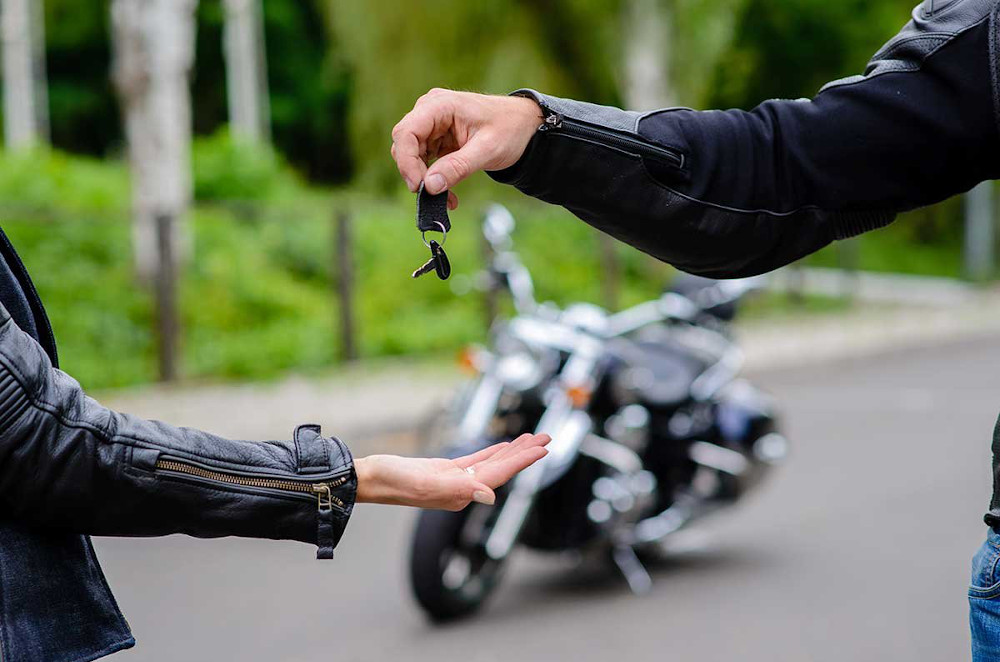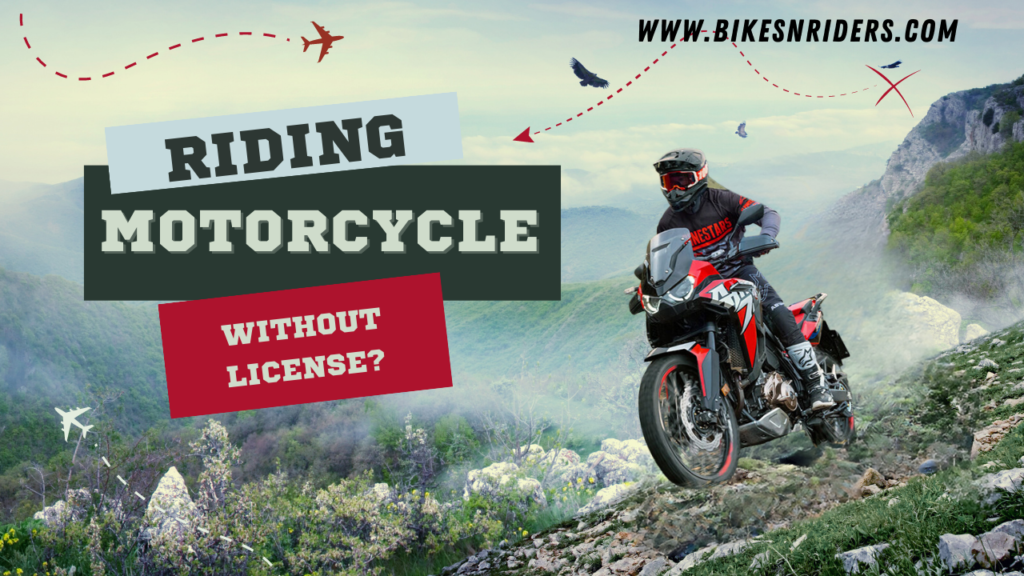While owning a bike can be exciting, it’s essential to understand the legal requirements before purchasing.
In most countries, having a motorcycle license is a prerequisite for buying a motorcycle. It is because riding a bike requires a certain level of skill and knowledge to ensure safety on the road. A license typically involves completing a training course and passing a written and practical exam.
However, there are some exceptions to this rule. In some instances, purchasing a motorcycle without a license may be possible, but restrictions and limitations exist. It’s crucial to familiarize yourself with the specific laws and regulations in your country or state to determine if buying a motorcycle without a license is viable.
What is a motorcycle permit/license?
A bike license is an official document allowing individuals to operate a motorcycle on public roads legally. It is obtained by completing a series of tests demonstrating the necessary knowledge and skills for safe motorcycle operation.
In most jurisdictions, a motorcycle license is a separate endorsement added to your driver’s license. However, some regions may require a standalone motorcycle license.
A motorcycle license ensures you have met the legal requirements and possess the necessary skills to operate a motorcycle safely.
Now let’s take a closer look at obtaining a motorcycle license.
How do I get a motorcycle license?
Obtaining a motorcycle license is essential for anyone interested in riding a motorcycle legally and safely. Each country or state may have specific requirements and procedures for obtaining a motorcycle license, but the general process typically involves the following steps:
- Research the requirements: Research the specific requirements for obtaining a motorcycle license in your country or state. It may include age restrictions, written and practical exams, and training courses.
- Study for the written exam: In most cases, you must pass a written exam to demonstrate your knowledge of motorcycle laws, safety regulations, and road signs. Study the provided materials and use practice exams to prepare.
- Enroll in a training course: Many places require individuals to complete a motorcycle safety course before obtaining a license. These courses provide valuable hands-on training and cover essential topics like proper riding techniques, defensive driving, and emergency maneuvers.
- Practice riding: Spend time practicing your riding skills on a motorcycle. It will help you gain confidence and familiarize yourself with the controls and handling of the bike.
- Take the practical exam: Once you feel prepared, schedule and take the practical exam. This typically involves demonstrating your ability to perform various riding maneuvers, such as starting, stopping, turning, and maneuvering through obstacles.
- Apply for the license: If you successfully pass both the written and practical exams, you can apply for your motorcycle license. Follow the procedures, pay the required fees, and submit the necessary documents.
It’s important to note that the specific steps and requirements may vary depending on your location, so it’s crucial to consult your local Department of motor vehicles or equivalent authority for accurate and up-to-date information.
What are the requirements for a motorcycle license?
To obtain a motorcycle license, there are specific requirements that you must fulfill. These requirements may vary depending on your country or state, so it’s essential to check the particular regulations in your area. However, here are some standard conditions:
- Age: Most places require a certain period to obtain a motorcycle license. In many cases, the minimum age is 16 or 18 years old.
- Written Test: You will usually need to pass a written test that assesses your knowledge of motorcycle operating rules and regulations. This test may cover signs, signals, and safe riding practices.
- Practical Test: After passing the written test, you will typically be required to take a practical test. This test will assess your ability to operate a motorcycle safely and effectively.
- Training Course: Some jurisdictions may require a motorcycle training course before obtaining a license. These courses provide valuable instruction on riding techniques, safety procedures, and traffic laws.
- Vision Test: A vision test is commonly required to ensure that you have adequate eyesight to operate a motorcycle safely.
- Identification: You must usually provide proof of identification, such as a driver’s license or passport when applying for a motorcycle license.
It’s important to note that these requirements are general guidelines, and the actual conditions may vary. Therefore, it’s essential to consult your local Department of Motor Vehicles or licensing authority for precise information applicable to your area.
What are the benefits of a motorcycle license?
Having a motorcycle license comes with several benefits that make it worthwhile to obtain one. Here are some of the advantages:
- Legal compliance: Driving a motorcycle without a license is illegal in most countries. By obtaining a motorcycle license, you ensure you can legally operate a motorcycle on public roads.
- Improved skills: Obtaining a motorcycle license typically involves completing a training course and passing a skills test. These requirements help you develop the necessary skills and knowledge to ride a motorcycle safely.
- Insurance discounts: Many insurance companies offer discounts to riders with valid motorcycle licenses. Having a license may make you eligible for lower insurance premiums, which can save you money in the long run.
- Access to more motorcycles: Some motorcycle dealerships or rental services may require a motorcycle license before allowing you to purchase or rent a bike. A request expands your options and will enable you to choose from a broader range of motorcycles.
- Joining riding communities: A motorcycle license opens the door to various riding communities and clubs. These groups often organize group rides, charity events, and other social activities that can enhance your overall riding experience.
- Increased confidence: Obtaining a motorcycle license can boost your confidence as a rider. Knowing that you have the necessary skills and knowledge to ride legally and safely can give you peace of mind and allow you to enjoy the riding experience fully.
How To Buy A Motorcycle Without A License??
When buying a motorcycle without a license, the most important thing to do is have a plan beforehand. You need the proper support and training to avoid getting in trouble if you ride the vehicle yourself. One way to avoid this situation is by looking into services offered by dealerships. Many dealerships offer delivery services for a fee when you purchase a vehicle, allowing them to take it back to your home safely and without any issues. Be sure to fully understand how much this fee is before agreeing with the dealership, as it could impact your overall budget for the purchase.
It’s also important to remember that when you operate a motorcycle on public roadways, there are additional rules and regulations compared to those for cars or other passenger vehicles. Taking lessons from a qualified instructor can be highly beneficial to ensure everything goes smoothly during your riding experience. Remember that some states also require special motorcycle endorsements and a driver’s license to operate a motorcycle legally—these should be taken care of well before attempting any bike operation. These steps can help you buy and use your new motorcycle without difficulty.
Can you buy a motorcycle without a license?
Buying a motorcycle without a license is possible, as there are no legal restrictions on purchasing a bike without permission. However, it is essential to note that while you may be able to buy a motorcycle without a license, it is illegal to ride it on public roads without a valid motorcycle license.
It’s important to understand that a motorcycle license is required to operate a motorcycle on public roads legally. A motorcycle license demonstrates that you have completed the necessary training and have the knowledge and skills to use a bike safely. With a request, you may have the skills to handle a bike safely, increasing the risk of accidents and injuries.
Moreover, riding a motorcycle without a license can have serious legal consequences. If caught riding without a request, you could face fines, license suspension, or jail time, depending on the jurisdiction. These penalties can vary depending on the severity of the offense and whether or not it is a first-time offense.
Additionally, riding a motorcycle without a license could affect insurance coverage. If you are involved in an accident while riding without a request, your insurance company may deny your claim, leaving you personally responsible for any damages or injuries.
While buying a motorcycle without a license may be tempting, obtaining a motorcycle license before riding is highly recommended. Getting a motorcycle license involves:
- Completing a training course.
- Passing a knowledge test.
- Demonstrating your skills in a practical riding test.
This process ensures you have the knowledge and skills to ride a motorcycle on public roads safely.
What are the penalties for riding a motorcycle without a license?

Riding a motorcycle without a license is illegal in most jurisdictions. Understanding the potential penalties imposed if you are caught riding without a permit is essential. The penalties for this offense can vary depending on the specific laws of your country or state, but here are some expected consequences:
- Fines: One of the most common penalties for riding a motorcycle without a license is receiving a hefty fine. The amount of the fine can vary, but it is typically in the range of several hundred to several thousand dollars.
- License suspension: In addition to fines, riding without a license can result in suspending your driving privileges. It means that you cannot legally operate any motor vehicle, including motorcycles, for a specified period.
- Impoundment of the motorcycle: In some cases, the authorities may impound your motorcycle if you are caught riding a bike without a license. Your bike will be towed and held securely until certain conditions are met, such as paying fines or proving that you have obtained valid consent.
- Legal consequences: Riding without a license is a violation of the law, and as such, it can result in a criminal record. It can have long-term effects, such as difficulty finding employment or obtaining specific professional licenses.
- Increase in insurance premiums: If you are caught riding without a license, it can also increase your motorcycle insurance premiums. Insurance companies view unlicensed riders as a higher risk and may charge higher premiums or even refuse to provide coverage altogether.
It is important to note that the specific penalties for riding a motorcycle without a license can vary widely depending on the jurisdiction and the circumstances surrounding the offense. It is always best to consult the laws in your area or seek legal advice if you find yourself in this situation.
Tips For Getting Your Motorcycle License
Getting your motorcycle license can be daunting, but it is essential for anyone who wants to ride a motorcycle legally. To increase your chances of success, you should do a few things before taking the written and riding skills tests.
First, make sure that you study for the written test. Many state DMV websites offer practice tests that can help you prepare. You can also find additional practice tests online or at your local DMV office. It is essential to thoroughly understand all traffic laws before taking the test so that you can answer the questions accurately.
Second, take some time to practice riding a motorcycle before taking the riding skills test. This may involve taking a safety course or asking a friend with a motorcycle license if they can teach you how to ride. Becoming familiar with all aspects of operating and controlling a bike is essential to pass the test. Lastly, bring all necessary documents for both tests, such as proof of identification, registration, and insurance for the bike you will use during testing day. With these tips in mind, you will be well on your way toward getting your motorcycle license!
Can You Get a Motorcycle Loan Without a License?
Getting a motorcycle loan without a motorcycle license can be tricky, but it is certainly possible. Banks usually don’t require that you have a motorcycle license to purchase one. However, they typically do require that you have a valid driver’s license.
To be eligible for the loan in the first place, you will need to be at least 18 years old. Additionally, any loan agreement is likely to require you to carry motorcycle insurance on your mechanical steed before it can be funded.
From filling out applications to finding an eligible lender, many hoops must be jumped through before you can secure a motorcycle loan without a motorcycle license. Having bad credit can make this even more difficult, as lenders may raise their standards and require more information when assessing your financial situation and ability to repay the loan amount.
Ultimately though, with some patience and careful preparation, it should be easy for most consumers to find an approved lender willing to provide them with suitable financing for their new ride.
FAQ
Can you buy a motorcycle with a motorcycle learner’s permit?
Yes, you can buy a motorcycle with a learner’s permit, but you may need a licensed rider to accompany you while riding it. Ensure you have proper insurance and check local laws.
Do I need a license to get a loan for a motorcycle?
You need a valid motorcycle license to get a loan for a motorcycle. Lenders require proof of ownership and motorcycle insurance for financing. Make sure to have the necessary documents before applying.
Conclusion
Buying a motorcycle without a license is not advisable. Safety should always be the top priority when riding a bike, and obtaining a permit ensures you have the necessary skills and knowledge to operate the vehicle safely. So, before you hit the open road, get your license and enjoy the thrill of riding responsibly.


